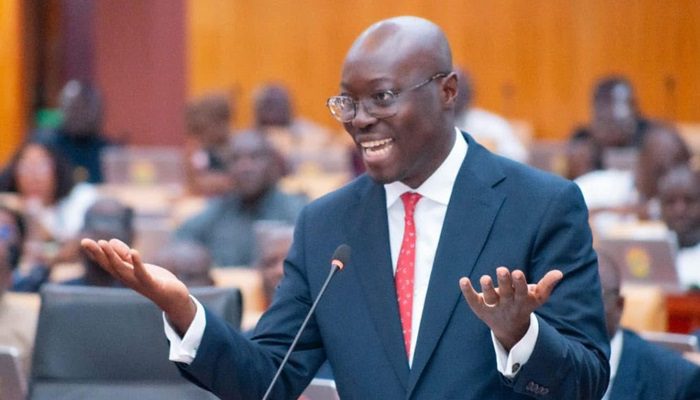Global Credit Ratings agency S&P Global Ratings has upgraded the country’s long- and short-term foreign currency sovereign credit ratings to ‘CCC+/C’ from ‘SD/SD’, marking a positive shift after a prolonged period of financial distress and debt restructuring.
The decision follows notable progress in Ghana’s debt management efforts, particularly the restructuring of both local and foreign currency debts, and signals cautious optimism about the country’s medium-term fiscal trajectory.
Debt restructuring success drives upgrade
The rating upgrade is largely attributed to Ghana’s progress in restructuring its commercial debt, building on the October 2024 Eurobond exchange and preceding domestic debt restructuring. According to S&P, Ghana is nearing the finalization of negotiations with commercial external creditors, mainly commercial banks, with the memorandum of understanding (MoU) with bilateral creditors already ratified on January 29, 2025.
While there remains some risk of creditor holdouts, S&P noted that this threat is mitigated by the principles of comparability of treatment under the G20 Common Framework, the presence of most-favored creditor clauses, and the advanced stage of the restructuring process.
These developments underscore a coordinated and largely successful attempt to stabilize the country’s debt landscape.
Ghana’s total external debt still comprises a sizable portion of its obligations—about 62% of government liabilities or 49% of GDP—making future debt sustainability highly sensitive to exchange rate movements and commodity prices, especially gold and cocoa.
Gold and remittances
One of the pillars supporting the improved ratings is Ghana’s strengthening external position.
$3.58bn as highest current account surplus on record
In 2024, the country recorded its largest current account surplus on record—$3.58 billion, or 4.4% of GDP—driven by booming gold exports and a surge in remittances.
The value of gold exports increased by 53.2%, fueled by rising international prices and enhanced local production initiatives, including a government effort to formalize the small-scale mining sector by purchasing gold from artisanal miners.
34.1% increase in remittance
Remittance inflows also surged by 34.1%, further supporting Ghana’s foreign exchange reserves, which climbed by $2.8 billion to reach nearly $4.6 billion.
These developments provided much-needed breathing space for the Bank of Ghana (BoG), enabling it to manage a volatile currency and slowly rebuild reserve buffers.
As a result, the Ghanaian cedi appreciated by 9.6% against the U.S. dollar as of April 2025, although S&P expects a return to gradual depreciation in the second half of the year.
Economic growth resilient amid austerity
Despite fiscal consolidation and reduced public spending, Ghana’s economy demonstrated surprising resilience.
GDP growth reached 5.7% in 2024, the highest since 2019, exceeding forecasts.
The recovery was driven primarily by rebounds in the industrial and services sectors, even as the agricultural sector struggled due to erratic weather patterns and reduced cocoa yields.
However, the formalization of gold trade may have unintended long-term consequences.
The expansion of small-scale mining, often unregulated and environmentally destructive, is threatening cocoa production by degrading arable land, polluting water sources, and incentivizing farmers to abandon cocoa cultivation for gold mining.
These pressures could undermine a key export sector and reduce the diversification of Ghana’s economy over time.
Fiscal reforms underway but challenges persist
Ghana’s fiscal outlook remains delicate. Although interest payments on debt have dropped significantly—from nearly 48% of revenue in 2021–2022 to around 25% in 2025 due to the restructuring—fiscal space remains constrained.
Ghana continues to face elevated inflation, high debt service obligations, and growing demands for social and capital expenditures.
The government, under the guidance of its three-year IMF Extended Credit Facility (ECF) program initiated in May 2023, is enacting a range of fiscal reforms.
These include amendments to the Public Financial Management Act, the reintroduction of fiscal rules, the establishment of an independent fiscal council, and efforts to streamline government programs and enhance tax compliance.
Despite these measures, fiscal consolidation will likely be slower than the government’s ambitious targets.
The administration aims for a primary surplus of 1.5% of GDP in 2025 and to cap expenditure growth at 9.2% annually through 2028—a significant departure from the historical average of 28% annual expenditure growth over the past 25 years.
In 2024, the official cash-based fiscal deficit aligned closely with budget projections, but a 3.7 percentage point overrun in the commitment basis deficit revealed a large build-up of arrears to contractors and suppliers. An audit is currently underway to assess the validity of these obligations, with the government hoping to nullify a considerable share of them.
S&P forecasts a gradual reduction in the debt-to-GDP ratio—from 71.4% at the end of 2024 to 47.4% by 2028—on the back of fiscal consolidation, strong nominal GDP growth, and a more stable exchange rate.
However, risks remain elevated due to the high proportion of foreign currency-denominated debt and lingering arrears, which constitute 5.3% of the total government debt stock.
Inflation falls slowly
Inflationary pressures remain a stubborn challenge. S&P expects inflation to stay above BoG’s target range of 6%-10% until at least 2028, although recent trends show gradual improvement. The central bank’s efforts to rebuild credibility, following years of monetized deficits, have begun to pay off.
Its managed float exchange rate regime, coupled with intermittent interventions, has helped stabilize the cedi in the short term.
Still, high interest rates and elevated inflation continue to erode household purchasing power and corporate profitability.
In the banking sector, total assets grew markedly in 2024, but so did risk. The non-performing loan (NPL) ratio increased from 20.6% in 2023 to 21.8% at the end of 2024.
However, capital adequacy remains robust following a recapitalization of banks in 2023, post-local debt restructuring.
Political uncertainty and global risks linger
Policy consistency through political cycles has historically been a weak point in Ghana’s fiscal governance, and S&P cautions that while recent reforms are encouraging, their durability remains untested.
The 2024 passage of the “Promotion of Proper Human Sexual Rights and Ghanaian Family Values” bill—awaiting presidential assent—has raised concerns among international donors.
The World Bank, in particular, may reduce or delay disbursements, mirroring actions it took against Uganda under similar circumstances. Such outcomes could further complicate Ghana’s external financing position.
S&P emphasized that Ghana’s ratings could rise again within the next 12 to 18 months if the country finalizes the restructuring of its remaining commercial debt, strengthens its fiscal position, and accumulates more foreign currency reserves than currently anticipated.
Conversely, ratings could be downgraded if financing conditions worsen or if fiscal discipline falters—especially in the run-up to the next election cycle.
Fragile gains, but real progress
Ghana’s path out of its debt crisis is far from complete, but the S&P ratings upgrade reflects meaningful progress on several fronts.
The economy has shown resilience, foreign reserves are rebuilding, fiscal reforms are underway, and the country is gradually regaining investor confidence.
Still, structural vulnerabilities—including high foreign currency debt, inflation, and socio-political risks—require careful navigation.
Whether the current gains are sustained will depend on the government’s ability to follow through with its reform agenda while maintaining social cohesion and investor trust in a politically sensitive environment.




